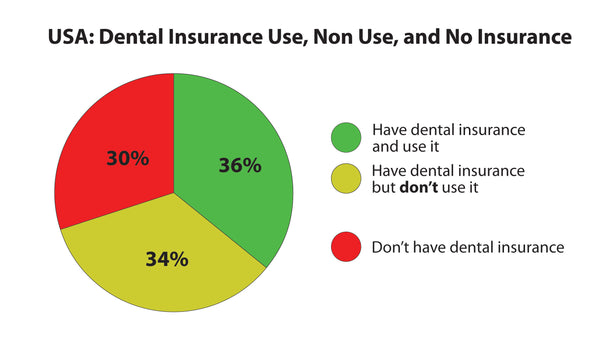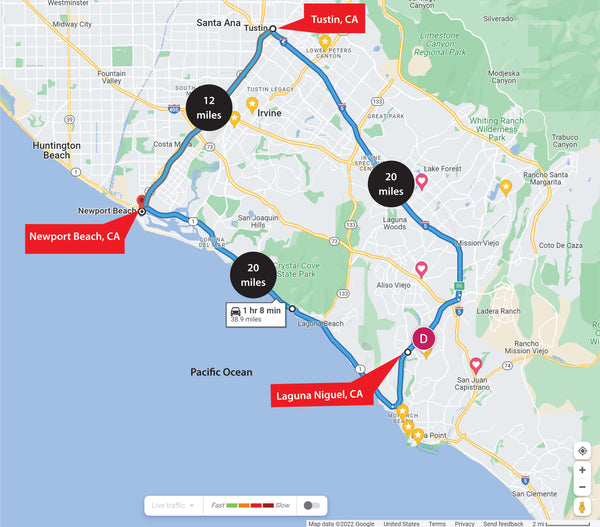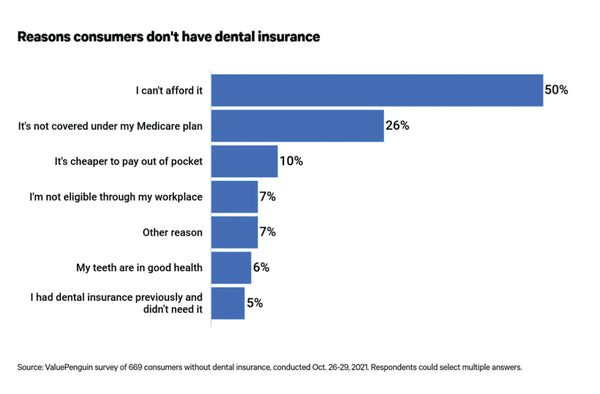Dental Fitness is Better than Dental Insurance
Dental Fitness is Better than Dental Insurance
I've never had dental insurance and I never will. Heres' why, and how I can help you if you don't have dental insurance either...
(Be sure to read the disclaimer at the bottom of this document.)
Welcome to the Dental Fitness Weekly Newsletter v.0006; ~2178 words; 9 minutes reading time
Look at the image below:

- https://www.news5cleveland.com/news/national/dental-procedure-child-death-lawsuit-arizona
- CIGNA
- https://www.businesswire.com/news/home/20220622005664/en/New-Report-77-Million-Adults-Do-Not-Have-Dental-Insurance
- https://www.moneyunder30.com/is-dental-insurance-worth-it
- https://www.fairhealthconsumer.org/index.php
- https://www.linkedin.com/posts/audrey-schechter-b0830ba_sick-profit-investigating-private-equity-activity-6998312116428402689-ar5A?utm_source=share&utm_medium=member_desktop
But that is changing due to the Great Resignation, Great Reset, layoffs, corporate restructuring, solopreneurism, inflation, etc.
As people lose jobs and/or become self-employed, dental insurance becomes optional. And with, or without dental insurance, most people think dental fees are too high. This is largely the blame of dental insurance -- because dentists must cut their regular fees about 50% to join insurance plans.

(So, in a way, I might be partially responsible for sudden fee increases in 1988 in southern Orange County, CA.)
Now back to the newsletter...
- They hate going to the dentist
- Their insurance sucks
- Can't afford dental fees
- Etc. (see image below)

Worst of all, about 30% of American adults don't have dental insurance at all. And that includes me. However, I'm down there in the bottom two categories of people who have good oral health and don't need insurance (about 3.3% of people).

Therefore, even though 70% of American adults have dental insurance, 64% of American adults either don't use it or don't have it. So dental insurance is basically a joke or a rip-off.
The reasons I don't have nor want dental insurance:
First of all, I've been into dental prevention from an early age, and I'm on a mission to help people control their oral health once and for all:
- I've been taking pretty good care of my teeth since 2nd grade (1962), when a dentist came to my classroom and taught us some oral hygiene and gave me my first really good toothbrush (that I used till about 9th grade).
- Then, in 1965, I began flossing toothpaste between my teeth. I figured that if food between teeth would lead to cavities, then toothpaste between my teeth might prevent cavities.
- 1981 I earned a degree in biology.
- In 1982, when I learned in dental school that tooth decay is an infectious, microbial disease. I vowed to teach everyone about that.
- 1986 I got my DDS degree.
- In 1989, I began using xylitol chewing gum because I read that it kills tooth decay germs
- In 1993, I began using oral irrigators in addition to flossing toothpaste between my teeth. Oral irrigators can flush gum depths to 6 millimeters, and oxygen bubbles in the water are toxic to gum disease germs.
- In 1994 I developed my concepts of Dental Fitness and I got on national television with my dental irrigator, "The Pearl Spa".
- https://youtu.be/01Pz411dAaY
- In 1998 I became a personal fitness trainer to improve my knowledge of fitness and apply more fitness concepts to oral health.
- 2006 I co-developed XyliMelts time-release xylitol delivery tablets, and then sold my share to OraCoat.
- 2017 I developed Orchestra Dental Probiotic tablets "to help your oral microbes play beautiful music together".
- 2019 I developed Breathific Dental Probiotic Oral Strips
- 2021 I developed Breathific Dental Synbiotic Oral Strips to rebalance the oral microbiome, and fight dry mouth, tooth decay, gum disease, and bad breath safely overnight.
Also, I believe dental insurance is a scam.
- True insurance is to cover problems that are rare but devastating. For example, nobody has home fires or car accidents every year. And even though everyone dies, it's a one-time event that is hopefully far in the future. Therefore, these types of insurance can be valuable and are even necessary.
- But, dental problems are the 2nd most common human affliction. Everyone has dental problems, and most people have dental problems every year. You can't cover a set of problems that everyone has all the time -- heck, I can't even get reasonable home insurance now because my house has had three water pipe leaks, and there was a fire 3 miles away in a canyon. So, I'm supposedly a bad risk for home insurance companies. I'm lucky to have home insurance, even though it's expensive.
- However, dental insurance is like a Ponzi scheme. They take your money and then make it nearly impossible to use the insurance. And when you actually can use it, they dribble the money out so slowly that it's frustrating to use. Basically, the only way dental insurance companies can stay afloat is to make insurance extremely hard to use.
- Waiting periods.
- Excluded procedures.
- Delayed payments
- They demand explanations, photographs, justifications
- They cause obfuscation, confusion, extreme complexity
- Low annual maximums that haven't changed since the 1990's
- Doctors need to cut their fees almost in half.
- No dentists want Medi-Cal or other government-sponsored insurance because the allowed fees are waay toooo low. The only way to make any money is to overbook and under-deliver, or hope that patients need major work, because preventive work makes no money.
- With "capitation" insurance, such as HMOs, doctors get paid a small monthly allowance based on the number of members in the HMO plan, but the allowable fees are so low that the only way the doctors can earn money is to add extra procedures to the treatments, and postpone appointments -- because they generally lose money when they see the patients. They make more money by collecting the monthly capitation payment and not seeing the patients, because the moment they actually see the patients, they suddenly have expenses to pay that exceed the monthly capitation payments.
- Annual maximums have not changed in 30+ years. Most dental insurance covers from $1,200 to $1,500 (if you're lucky). That was okay in 1986 when I got out of dental school, because crowns were about $450 to $650 at that time. You could usually get about two or three crowns with your insurance. But nowadays, crowns are easily $1,200 or more, so you can barely get one crown out of your insurance. For insurance to catch up to current times, the coverage would need to be $4,500 to $6,000 at least. But that will never happen in my lifetime.
- Lastly, dental insurance is now the lazy dentist's way to do marketing. So, instead of being a true businessperson who figures out their target market, and gets out of the office and into the community with boots on the ground to be a member of the community and drum up business, it's a lot simpler for dentists to sell their souls to the insurance companies. Just agree to cut fees in half for the insurance companies, sign up with insurances to get put on provider lists, let the insurance companies send out the lists, sit back and wait for patients to pick the dental office, and then try to make money by raising fees and overbooking.
If that isn't bad enough, there is a growing wave of dental practice gurus teaching dentists how to escape dental insurance.
These actors go around telling doctors how to drop their insurance affiliations and simply charge patients their regular fees. If patients have insurance, the doctors basically tell the patients that insurance is like a discount coupon or a rebate. So, instead of the doctor having to charge $800 for a crown and the insurance pays $375 and the patient pays $425, the doctor charges the patient $1,600 and the insurance reimburses the patient maybe $400, if the patient is lucky to get a payment from the insurance.
Then maybe the patient can negotiate fees with the dentist or sign up for an interest-free loan, or try to find a different dentist who is willing to work for half price in today's crappy economy.
I could write a book on the dental schemes I've seen, but it wouldn't help you and it would just dredge up bad memories.
Dentistry would be a pretty cool job IF dental insurance didn't get its grubby hands into the pie. Dentists could control their own fees instead of trying to game the system.
Therefore, instead of relying on dental insurance, or even dental care, I want to teach you how to avoid dental problems in the first place, so you can be like Dr. Ellie and me, and never need dental insurance. And rarely need dental care, for that matter.
So, to that end, every day I will post one simple, actionable tidbit of Dental Fitness advice that will help you control your dental destiny.
If you are an entrepreneur, solopreneur, self-employed, laid off, fired, between jobs, or just hate dentistry, this will be for you.
Dr. Ellie Phillips is a pinnacle of dental health and prevention. You should follow her ASAP.
Dr. Mark Burhenne is another pinnacle. He runs a blog and a podcast and helps people avoid dental problems.
And I offer my Dental Fitness concepts that help you develop your own customized dental prevention programs and regimens.
In Summary
I told you all that stuff above so you can see dental insurance for what it is and from a dentist's perspective.
The REAL dental health problem in America is not lack of dental care nor lack of insurance, high dental fees, etc.
The REAL problem is not understanding the simplest thing about oral health -- that tooth decay is a disease and we must constantly fight the microbes.
And the simplest ways to start fighting the decay microbes are to:
- Rinse out your mouth vigorously with water at least 3x after every meal, snack or beverage (other than water).
- After rinsing with water, use xylitol gum after every meal, snack, beverage, and between meals. You need to use xylitol 7x per day every day. That's about 7 grams spread out through the waking hours. If you cannot rinse with water or you don't have water handy, then use the xylitol gum. If you don't have xylitol gum handy, at least rinse with water.
- If you have neither water nor xylitol gum, then at least use a toothpick to remove as much crud from your teeth and try to generate a mouthful of saliva to swish around in your mouth.
------
Now that you’ve gone through this basic Dental Fitness education, you can jumpstart the rest of your Dental Fitness training in the links below.
Whenever you're ready, here are some ways I can help you, your family, and friends:
1. Improve your home oral hygiene with this free, downloadable, 22-page, PDF booklet: "7 Easy Steps to Start Supercharging Your Oral Hygiene Efforts".
2. Get my 58-page downloadable book "The RENUZORAL Method of Dental Fitness" for just $5.97 USD.
3. Visit my websites RENUORAL.com or Breathificdental.com and get any of the products I recommend
4. Enroll in my Oral-Systemic Health for Life Masterclass to create customized, effective dental fitness systems and take charge of your dental destiny once and for all.
To our oral-systemic health!
Dr. Steve Edwards
PS,
Next Week's Newsletter will be a surprise, because I don't know yet.
-----
If you are not yet a newsletter subscriber, click the link below to subscribe:
Disclaimer:
The purpose of this document is to improve dental literacy. It is not meant to provide dental or medical advice, treat or prevent any disease, or take the place of regular dental care. As individuals differ, so will the results of the products and exercises in this document. The publisher, RENUzORAL, and Dr. Edwards shall have neither liability nor responsibility to any person or entity with respect to any loss or damage related to, or alleged to be related directly or indirectly to the content herein. This document is written mainly for average people in average dental and medical health from ages six through the golden years. For more specific or severe problems such as oral cancer, dry mouth, or advanced periodontal disease, and when starting any plans of nutrition, diet, supplementation, exercise, or prevention, please consult your dentist and/or physician to ensure that you are in proper health. Some of you may have medical problems or allergies that might limit your participation in the steps that follow. For additional preventive dental educational materials, videos, training, seminars, services, and links to products mentioned in this document, please visit: https://www.renuzoral.com.

Leave a comment
Please note, comments must be approved before they are published